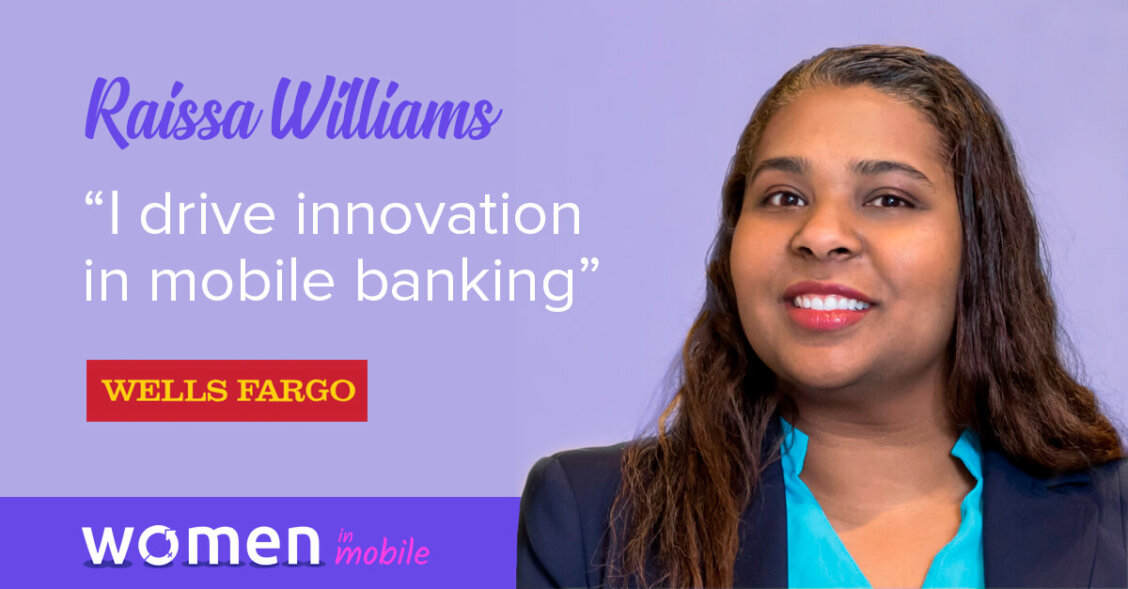
Women in Mobile: Career Lessons from Raissa Williams @ Wells Fargo
This article is part of Liftoff’s Women in Mobile series in partnership with mBolden, a non-profit organization dedicated to helping women get connected, stay inspired and become empowered through content and events.
Driving big change at well-established companies is not for the faint of heart, but Wells Fargo’s Raissa Williams thrives on breaking new ground. Raissa currently heads up Wells Fargo CEO Mobile®, a mobile banking solution used by corporate and business customers. As part of our “Women in Mobile” series, we spoke with Raissa about leading innovation as a woman in tech.
How did you decide to pursue a career in mobile?
I started my career in mobile back in 2008 when I first joined Wells Fargo and was selected for a post-MBA leadership development program. One of my rotational opportunities was with Wells Fargo retail consumer mobile, the team responsible for the Wells Fargo Mobile® app. Back then, mobile was a new and growing channel. I was excited about the opportunity to simplify banking for our customers using native mobile device capabilities such as the camera, voice, and touch, which inspired me to pursue a career in mobile.
What has been your most career-defining moment?
I was once introduced as “the lovely Raissa Williams” when I was invited to pitch an idea. First impressions last, so I as soon as I got up to speak, I quipped, “As most of you know, I have a daughter and I tell everyone, call her smart, call her capable, call her kind, but never ever call her ‘pretty’ when meeting her for the first time.” At first, there was a bit of a chuckle from some of the men, but the other women in the room gave me knowing glances as the ice was broken and I established my credibility. They knew exactly what I was talking about. The societal emphasis on beauty can sometimes detract from focus on the professional value women bring to the workplace.
What challenges have you faced in an industry traditionally dominated by men?
One challenge is that I often feel invisible at professional conferences where sometimes people don’t assume I’m in the type of role I am in. This is especially true at tech conferences, so I have to consciously energize myself to proactively make a speaker proposal or network more effectively by standing in the center of the room at a reception to start conversations.
Who has been your biggest advocate/mentor?
I’ve been fortunate to have incredible professional mentors and sponsors, but I would say that my parents have been the greatest source of influence on my life. My dear father, Papa, always told me that if I achieved academically and professionally, then I’d be the one to choose my own life path. He told me since I was a little girl that it was important to have my own goals, interests, and passions – and to demonstrate active pursuit of them. His generosity, concern for others in unfortunate situations, together with his tough, no-nonsense negotiation style and truthfulness in business and personal relationships have been a model for my management dealings over the years. My mother’s charisma, charm and storytelling made a huge impression on my networking and public speaking styles. In my career, I try to emulate the best aspects of both of my parents.
What do you see as some of the best and worst initiatives designed to promote women in tech?
The best initiatives to promote women in tech are ones focused on exposing women to new technology or providing skill training they can take back to their jobs or use to gain a stretch assignment or promotional role. In my opinion, initiatives which focus on more nebulous and nuanced topics like career-personal balance or professional image makeovers are less helpful, and sometimes lack sensitivity and inclusiveness for issues specific to women of color.
Who is your biggest career inspiration in the industry?
Within the financial tech and innovation space, one of my biggest inspirations is Beverly Anderson who leads Cards and Retail Services at Wells Fargo. She sets the gold standard in her ability to have her finger on the pulse of new leading initiatives within each one of her businesses and her incredible business acumen with their numbers.
Within the community and non-profit space for tech, one of my biggest inspirations is Kimberly Bryant, African American electrical engineer who worked in the biotechnology field at Genentech, Novartis Vaccines, Diagnostics, and Merck. In 2011, Bryant founded Black Girls Code, a non-profit that provides coding and tech educational programs to black girls who are underrepresented in technology careers.
Is there one piece of advice you wish somebody gave you at the beginning of your career?
Know your customer, their wants, pains and needs. Know your tech, what it does, how it works, and what it can do. I always say, “It’s only science fiction until it’s not.” Know your numbers, metrics and dollars, you should be able to say them in your sleep. Be the person in the meeting who has the facts and has a point of view recommendation to offer based upon them.
Fun fact about you that few people know?
While in college, I served as United States White House intern in the Office of News Analysis during the Clinton Administration. It was a wonderful experience to go back and forth between the White House West Wing and the Old Executive Office Building, supporting our government in the fast-paced environment while eating M&Ms.
